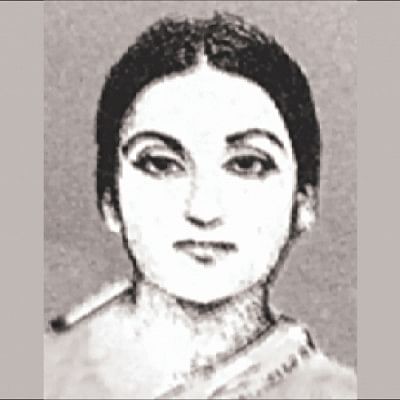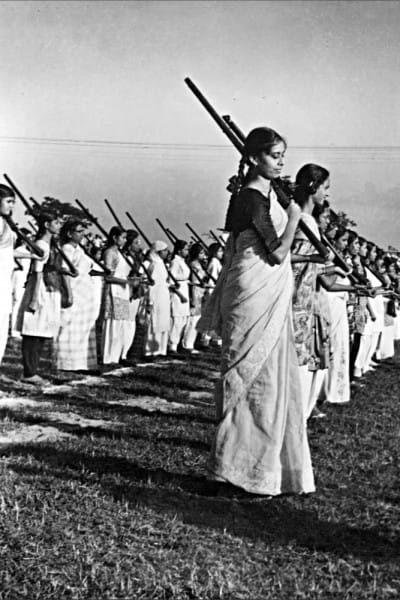Lutfun Nahar Helen- A teacher and revolutionary

The history of Bangladesh’s liberation, achieved through the supreme sacrifices made by lakhs of patriotic people and revolutionary leaders in the armed war of 1971, is the history of the greatest achievement of our national life. I am writing this article to reminisce about the struggle and sacrifice of one of the valiant freedom fighters of this soil – those who have written their names in the pages of our history with their blood. She is Shaheed Lutfun Nahar Helen.
Helen was born in Magura in 1947. She was sixth among the five sons and nine daughters of Md. Fazlul Haq, a renowned and honourable man of the town. Helen was a little different than others since her childhood. She had a strong wish to become a renowned personality by achieving higher education, so she was very attentive to her studies from early childhood. During her school education, she used to stand first in her class every year.
Helen’s father as well as other members of the family were politically progressive people. Her father Md. Fazlul Haq was an influential leader of the NAP and the Krishok Samiti of Magura.
Influenced by her father’s as well as the entire family’s progressive ideology and by her proclivity to fight for justice, Helen started participating in the democratic movements led by the students since her school days. She was in the forefront of the processions chanting slogans during the education movement of 1962 and in the movement against the Ayub regime. When she was a student of Magura College, she became the secretary of the women wing of the college’s Chhatra Shangshad. She led the student movement as a vice-president of the then East Pakistan Chhatra Union in Magura sub-division.
While she was studying BA, she was enlightened by the idea of Bengali nationalism through participating in the movement against the Pakistani autocratic regime’s oppression on the Bengali nation. In 1967, when a ban was imposed on Radio Pakistan, Dhaka, to broadcast Rabindra sangeet, Helen wrote in her diary:
“Ashar 24, 1374 BS
...The government has become active again to suppress the Bengali heritage...Today they have put a ban on Rabindra sangeet, tomorrow they might say that the literary works of Tagore are not in favour of the Muslim traditions...Twenty years after the liberation, they have realised that Rabindranath Tagore is an Indian poet… Rabindranath is not just a poet of West Bengal. He is a poet of the entire Bengal.... He is a poet of the world.
We cannot just disregard the imposition of such a ban by terming it their ignorance. This is essentially an attempt to belittle the Bengali nation, an attempt to trample on the Bengali heritage…
… We are Bengalis, we believe in Bengali heritage. We will preserve our heritage at the cost of our blood ... the way we did in 21st February…”
……...
Helen and I got married in May, 1965. We were a happily married couple since we shared the same ideology and the same political views. In the same year, after completing our studies, Helen’s brother Md. Mahfuzul Haq Niro and I had joined national politics. On the other hand, being a student, Helen was more active in student politics till 1968 and at the same time would assist us in our political activities. Our ancestral home was in Harekrishnopur village, in Mohammadpur thana of Magura. Helen used to go there to work with the NAP, Krishok Samiti and Chhatra Union during her student life. In my absence, she used to maintain communications with the activists.

She was committed to participate and, if needed, sacrifice anything in the fight that had been going on to liberate the working class people from the oppression and deprivation that they were facing. She wrote in her diary:
“Ashwin 5, Friday, 1374 BS, Night
This is to remind myself of the promise I made to myself. Under the circumstances, I must actively participate in the movement to liberate the proletariat… there is no happiness in living a life of luxury and affluence. I thought about it a lot – I don’t find any wish in the deepest corners of my mind to live a life that is self-centered and luxurious.”
………
After passing her BA exams, Helen joined Magura Girls’ High School as an assistant teacher in 1968. She earned the reputation in the school as a responsible and sincere teacher. She was also involved in politics and played an important role in the 11-point movement of 1969.
……..
At the beginning of our Liberation War, under the leadership of Awami League, the war was run for some time and then the Awami League leadership took refuge in India. And the Pakistani military slowly took position in the military bases of the big towns. With the assistance of the Al-Badr, Al-Shams and other collaborators, they committed genocide, rape and arson attacks in the villages and towns all across the country. Those of us who were involved with the Jashore zilla unit communist party, got separated from the central leadership.
So, in coordination with the communist party of Jashore and the progressive leaders of the leftist parties, we decided to run the war against the Pakistani occupation army and their associates – the razakars and al-badrs…
……Our force had gained strength by taking control of the armory in Norail town, by releasing the inmates of Jashore central jail and by running small-scale operations. Many of the Bengali police and soldiers who had fled the cities and took refuge in the villages joined our force to take part in the war…
… Till August, 1971, Helen used to stay at her parents’ house in Magura town and at my village home alternately. One day, the razakar and al-badr forces in coordination with the Pakistani army barricaded Helen’s parents’ house to kill her elder brother Mahfuzul Haq and other brothers. But luckily, they went into hiding and saved themselves. Amid such risks, Helen stayed at her parents’ house in Magura town with our two-year-old son Lutfe Ali Dileer. At that time, she was entrusted with the responsibility of informing us about the activities and plans of the rajakars and the Pakistani army…
One day, we attacked the razakar camp in Mohammadpur thana and killed a lot of razakars. Right after that, we attacked the thana, took it under our control and seized all the weapons. After we freed the area, we made a camp in the southern part of the thana for providing training to the freedom fighters.
Around this time, Helen joined us to directly participate in the war. Our only son Dileer was also with her. In the camp, Helen’s responsibility was to encourage girls, particularly of the landless peasant families, to participate in the war; discuss with them the ways and the expected result of their participation; take care of the political and war-related books; take care of the meals and assist the sick freedom fighters.
After we took control of the Mohammadpur thana and destroyed the razakar camp there, the Pakistani army and razakars started attacking our force at various camp areas all across Jashore. At one point, they attacked our main base at Pulum. In order to strengthen our force in Pulum, we then joined all our forces together. At the end of September, when we joined the forces of Mohammadpur with the forces of Pulum area, Helen was staying at the southern part of Mohammadpur thana.
As we started our journey towards Pulum from Mohammadpur with the stronger part of our force, one of my fellow compatriots informed me that Helen came to a village adjacent to our village to meet me. But considering the risks our force might face if we waste time here and the fact that there was no one else except me to lead the force at that time, I decided to be with the force than to meet with Helen…
…….It was a day in the second week of October, when the Pakistani army and razakars suddenly attacked our Pulum base in the morning and continued until late in the afternoon. They did considerable damage but failed to defeat us. I was talking to some of my comrades that evening about the state of the war when one of my former students appeared and said he wanted to give me some news. But he stood in silence. I asked him what had happened. He said it was bad news and he was at a loss for words. I said bad news were expected in times of war. Then he told me how Helen was caught by razakars and got brutally killed. I remained speechless for a while. Then I told him, “We are really busy fighting this war. You don’t have to tell me anything more. Please leave.”
While our forces from Mohammadpur was staying at a village in Pulum area, Helen, along with her two-and-a-half-year-old son Dileer, were detained by razakars. She was taken to Magura town and handed over to high officials of Pakistani army for interrogation. Learning about her misfortune, her old father and relatives begged for her release. But the pro-Jamaat dalals of Magura became the most difficult hurdle for her release. They told Pakistani officers that since Helen was the sister of leftist leader Mahfuzul Haq and wife of Ali Kadar, chief of the freedom fighters of Mohammadpur and a leftist leader, there was no question of releasing her.
So the extremely communal, anti-liberation collaborators got what they wanted. Helen died on the night of October 5, 1971. It was shab-e-barat, a holy night for all Muslims. They snatched the crying infant Dileer away from her mother and sent him to his grandfather’s house. Helen was tortured to death. They tied her body to a military jeep and drove it to a diversion canal of the Nabaganga river on the outskirts of Magura town, dragging her all the way.
Translated from Bangla by Naznin Tithi, member of the Editorial team at The Daily Star.

 For all latest news, follow The Daily Star's Google News channel.
For all latest news, follow The Daily Star's Google News channel. 



Comments